IFAT 2016: Berghof’s Innovation Day explored future of industrial effluent treatment
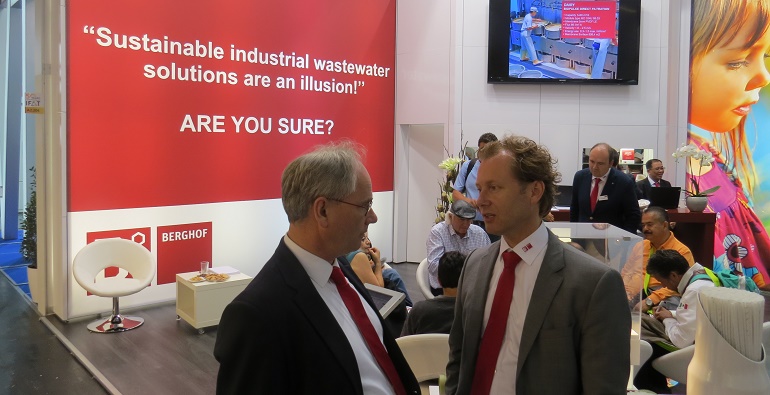
On the occasion of the 50th anniversary of Berghof Group, its membrane technology division held an innovation day at IFAT on the future of industrial waste water treatment.
Experts talked about the current developments and their expectations for future developments. Although the energy efficiency is still a big issue, industry users have already embraced the technology for the treatment of their waste water. The meeting made clear that the technology is so divers that even for experts the future developments are hard to predict.
The meeting took place on 30 May and was initiated by Berghof membrane technology that is based in Leeuwarden, the Netherlands.
The environmental trade fair IFAT opened its huge exhibition floor on 30 May and will last till 3 June.
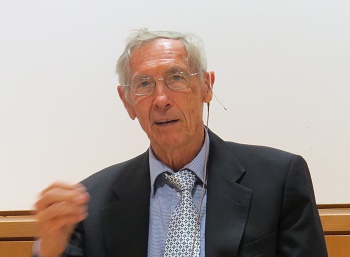 Professor Heiner Strathmann recalled the early days of the membrane research within Berghof when he was dreaming about turning deserts green.
Professor Heiner Strathmann recalled the early days of the membrane research within Berghof when he was dreaming about turning deserts green.
Greening the desert
Berghof Membranes’s Innovation Day started off with a look back at the firm’s history of membrane technology, by professor Heiner Strathmann at University of Stuttgart. He recalled the pioneering days having started at Berghof as young researcher.
“We realised the opportunities of low pressure separation and dreamt of greening deserts and making artificial kidneys”, said Strathmann.
Many small suppliers
According to professor Strathmann the market for membrane technology really took off in medical world, but in the separation world it remained a niche technology. “The only big companies to have showed some interest in membrane technology for water treatment are GE and Siemens. All other suppliers are small SMEs.”
However, the dreaming has remained Strathmann told and he mentioned the future application of membrane technology in stationary batteries and in artificial organs.
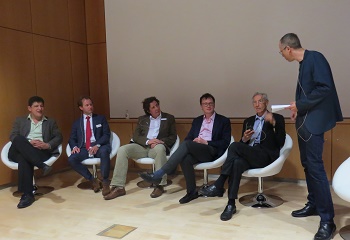 The panel that looked ahead in the future of membrane waste water treatment.
The panel that looked ahead in the future of membrane waste water treatment.
Rapidly matured
Other experts specially mentioned the current status and future of membrane bioreactor technology (MBR) for the waste water treatment, the field in which Berghof is active at the WaterCampus Leeuwarden in the Netherlands.
It was mentioned that MBR-technology has matured rapidly and has become best practice in the food and beverage industry worldwide. Compared to other waste water treatment technologies its advantages are a small footprint and the delivering of a good effluent quality.
Submerged versus side stream
The discussion focused more on the future for the different versions of MBR-technology, being submerged, side stream, aerobe and anaerobe. Submerged aerobe MBR’s are by far the most successful, especially for the treatment of municipal sewage water.
Professor Simon Judd at Cranfield University remarked that sidestream MBR-technology is catching up quickly as suppliers have managed to improve the energy efficiency. “Especially industrial users are interested in this type of MBR as the membranes are better accessible making cleaning easier. It also has the advantage that the use of cleaning chemicals is less of a risk to the biology.”
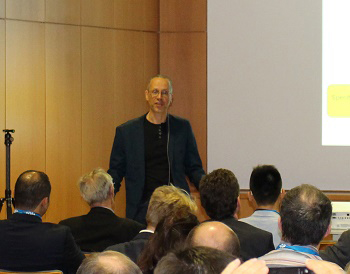 It is impossible to say whether submerged membranes are better than side stream ones, or hollow fibers versus plates, or aerobe versus anaerobe. It's horses for courses, said professor Simon Judd.
It is impossible to say whether submerged membranes are better than side stream ones, or hollow fibers versus plates, or aerobe versus anaerobe. It's horses for courses, said professor Simon Judd.
Horses for courses
Judd explained the complexity the design criteria for MBR-technology and the importance of a high water flow (shear) along the membranes. The shear takes away the fouling from the membranes, but high shear means also high energy consumption. “The challenge seems to be to use less air to reduce energy consumption, but at the same time keep up the performance”.
Judd praised suppliers to have already come a long way. For the design of anaerobe MBR he suggested the use of biogas to create the up flow shear. “The biogas could be used to scrub the membranes”, he said. “Apparently it is not that simple otherwise it would already have been picked up”, Judd immediately added.
Horses for courses, was the expression he used for the application of the different MBR-technologies that have emerged and are being used for the many different municipal and industrial waste waters and different circumstances.
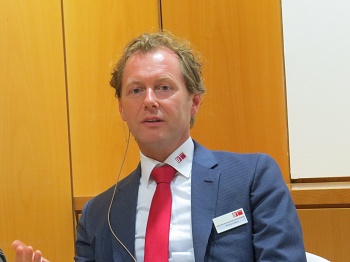 Not to much the price or the energy efficiency, but the reliability of the installation is the real concern of industrial MBR users, said panel member Rick te Lintelo of Berghof.
Not to much the price or the energy efficiency, but the reliability of the installation is the real concern of industrial MBR users, said panel member Rick te Lintelo of Berghof.
Future for anaerobe MBR
The day was ended with a panel discussion where the issue of anaerobe MBR for the treatment of municipal waste water was raised. Most municipal MBRs are aerobe, where as an anaerobe MBR has the advantage of producing biogas.
According to the panel this has to do with the lower biomass concentrations in the municipal waste water, compared to the industry. This simply implies a much lower biogas recovery.
Also the high methane-concentration in the effluent was considered a particular concern for municipal users as they discharge their effluent in of nearby the city.
What really matters
“Anaerobe MBR is no golden opportunity for the treatment of sewage water”, concluded Rick te Lintelo (right on top photo) at the end of the day. Te Lintelo is director sales and marketing at Berghof membrane technology. Berghof is supplier of the Biopulse technology that includes an intelligent sensor system, allowing to adjust the treatment process to the fluctuation of the influent. Berghof’s customers are the industry.
“We notice our clients are particular interested in the reliability of their waste water treatment”, Te Lintelo wrapped up the discussion. “Their main concern is the production process. Not so much the waste water treatment in itself. Of course price and energy use matter, but what really matters is that it has to function 24/7 under all circumstances”.
Read more on this website
• IFAT 2016: Paques presents flexible Biopaq-ICX for anaerobic industrial water treatment, 1 June 2016
• IFAT 2016: Three giant H2O molecules hanging over Dutch pavilion symbolize circular water use, 31 May 2016
• IFAT2014: Vibrant water tech business at Holland pavilion in pictures
• IFAT 2014: Paques celebrates sale of 1,000th Biopaq-IC plant to JBF Petrochemicals, India, 7 May 2014
• Meet the Dutch water sector at IFAT 2016, May 2016
More information
IFAT
www.ifat.de/en
Berghof Membrane Technology
Leeuwarden, the Netherlands
+31 58 810 01 10
www.berghofmembranes.com



